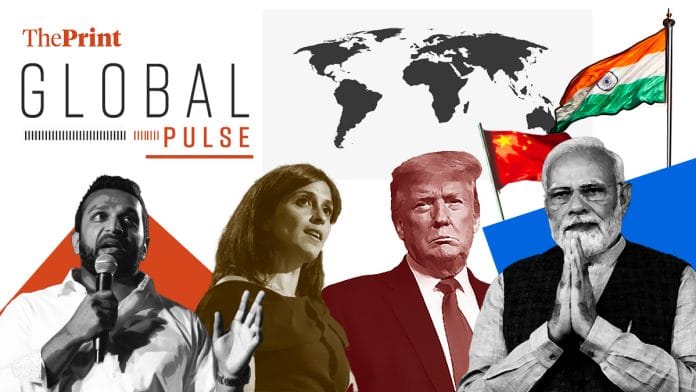New Delhi: Following the election of Donald Trump to a second term as President of the United States, both global and Indian media have turned their attentions to the two Indian Americans who are front and centre: soon-to-be Second Lady Usha Vance, and the man tipped to be CIA director, Kash Patel.
A New York Times profile of Kash Patel from three weeks ago describes him as “valued more for subservience than expertise, and eager to pursue a vengeful president’s whims.”
Patel seems almost guaranteed to become the next CIA director or attorney general, and if he fails Senate confirmation, to have a top job on the National Security Council. Described as a “bombastic former public defender known for his antipathy toward the intelligence agencies”, Patel rose through the ranks as a dogged defender of Trump. He had first impressed Trump as the primary authority on the secret Nunes memo, which Republicans used to undermine the Justice Department’s investigation of Russian meddling in the 2016 election.
Usha Vance is Vice President-elect J.D. Vance’s incredibly accomplished wife—a top lawyer at a national law firm who graduated from Yale and Cambridge University.
“Whilst her husband regularly rails about ‘woke’ ideas he says are pushed by Democrats, Mrs Vance was formerly a registered Democrat and is now a corporate litigator at a San Francisco law firm which proudly touts its reputation for being ‘radically progressive’,” the BBC reported in a profile after Vance was announced as Trump’s running mate.
The Washington Post has a story on the disappointment within the Indian-American community over Kamala Harris’s loss.
“Indian Americans waited anxiously to find out whether one of their own might become the next president. For many, the moment felt historic—and was another sign of the growing political power of Asian Americans,” the Post reports.
But as results rolled in, the dejection began to set in. However, the angst isn’t universal—a significant chunk of the diaspora supports Trump. “In an immigrant community stratified by religion, language, caste and class, Harris’s background was embraced by some but rang hollow for others. Some have said they viewed Harris as Black, but not Indian American, and that her identity matters less than policies,” the Post says.
The New York Times writes that India is better positioned than many major countries for a second Trump term.
Besides the close bond that Modi shared with Trump in his first term, India has since emerged as a counterweight to China that could help diversify global supply chains. “But Mr. Trump’s chronic unpredictability could challenge the Indian bureaucracy’s infamous preference for a slow and steady pace. And on the campaign trail, he singled out India’s high tariffs on American goods, saying he would reciprocate,” writes NYT.
It also signals that immigration could be a point of friction—especially as Trump restricted the H1B visa, which many Indians use in the US. Indians also make up the third-largest population of undocumented US immigrants, and Trump has repeatedly threatened deportations which could have an effect on Indo-US relations.
In non-US election related news, Global Times ran an interview with Sudheendra Kulkarni on how “good seeds need to be sowed in fertile soil” for India-China relations to have a real breakthrough.
Kulkarni, former director of operations of the PMO under Vajpayee, says that “the ice has been broken” between India and China, and shares his optimism with Global Times that the momentum will continue.
In response to a question on whether India and China can truly work on their relationship when the two countries are pitted against each other by the West—or as Global Times puts it, “India constantly being courted by the West”—Kulkarni says that this responsibility for the relationship rests with both countries. “The more India-China relations become normal, leading to expanding areas of trust-promoting win-win cooperation, the less influential these anti-China forces will become,” he says.
The convergence of the “Chinese Dream and the Indian Dream” is the only way to resolve these tensions, the piece ends.
Meanwhile, the Washington Post also ran an AP wire on the Kashmir assembly passing a resolution demanding the central government to restore the state’s autonomy. “The assembly passed the nonbinding resolution by a majority vote to noisy scenes in the house,” the story says.






